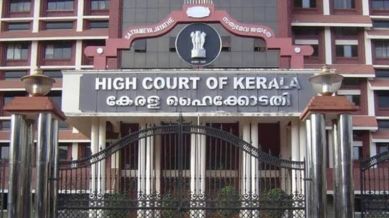Stay updated with the latest - Click here to follow us on Instagram
After Waqf challenge, Kerala HC sets aside commission to probe Munambam land row
The genesis of the controversy can be traced to 1902, when the erstwhile Travancore royal family leased 404 acres of land, already occupied by fishing communities, to a trader named Abdul Sathar Moosa Sait, who had settled in Mattancherry near Kochi.

In a setback to the state government, the Kerala High Court Monday set aside the appointment of a judicial commission assigned to find a solution for the vexed Munambam land controversy.
The bench of Justice Bechu Kurian Thomas quashed the appointment of the commission comprising retired acting chief justice C N Ramachandran Nair on the ground that the issue is under the consideration of the Waqf Tribunal. The appointment of the commission was challenged by the Waqf Protection Samithi.
The government had appointed the commission in November last year to protect the legal rights of the occupants of the disputed Munambam land. The Kerala State Waqf Board has long staked claim over 404 acres of land in Ernakulam district’s Munambam coast — land inhabited for generations by some 600 Christian and Hindu families.
The commission was told to submit a report within three months. At the same time, the state government had assured the occupants that those with valid land documents will not face eviction and that the commission had been appointed to protect their rights as well as finding a lasting solution.
The genesis of the controversy can be traced to 1902, when the erstwhile Travancore royal family leased 404 acres of land, already occupied by fishing communities, to a trader named Abdul Sathar Moosa Sait, who had settled in Mattancherry near Kochi.
In 1948, his successor and son-in-law Mohammed Siddeeq Sait got the leased land registered in his name and decided to hand over its management to the Kozhikode’s Farook College, established in 1948 to educationally empower Muslims of Malabar (northern Kerala).
On November 1, 1950, a waqf deed — document that establishes a waqf property permanently dedicated for charitable or religious purposes under Islamic law — was registered at the sub-registrar’s office in Edappally, Kochi, executed by Sait in favour of the president of the Farook College.
The management of Farook College received the title deed for the land a decade later and a legal battle ensued between the land’s occupants, who did not have legal documents to prove ownership despite residing there for generations, and the college’s management, which wanted to evict them.
Eventually, in an-out of-court settlement, the college management decided to sell the land to its occupants at market rate. Documents show that in the sale deeds, the college management did not mention that the land was waqf property granted to the president of the college management committee for the purpose of education, instead saying it was received though a gift deed in 1950.
In 2008, following a number of complaints against the state’s waqf board, the then Communist Party of India (Marxist) government under V S Achuthanandan appointed an inquiry commission led by retired district judge M A Nissar. The terms of reference for the commission included fixing responsibility for the loss of assets by the board, and recommending action for their recovery.
The commission submitted its report in 2009. In it, it deemed the land in Munambam to be waqf property, and said that the college management had approved of its sale without the board’s consent. It also recommended action for its recovery.
In 2019, the waqf board suo motu declared the land to be waqf property under sections 40 and 41 of the Waqf Act of 1995.